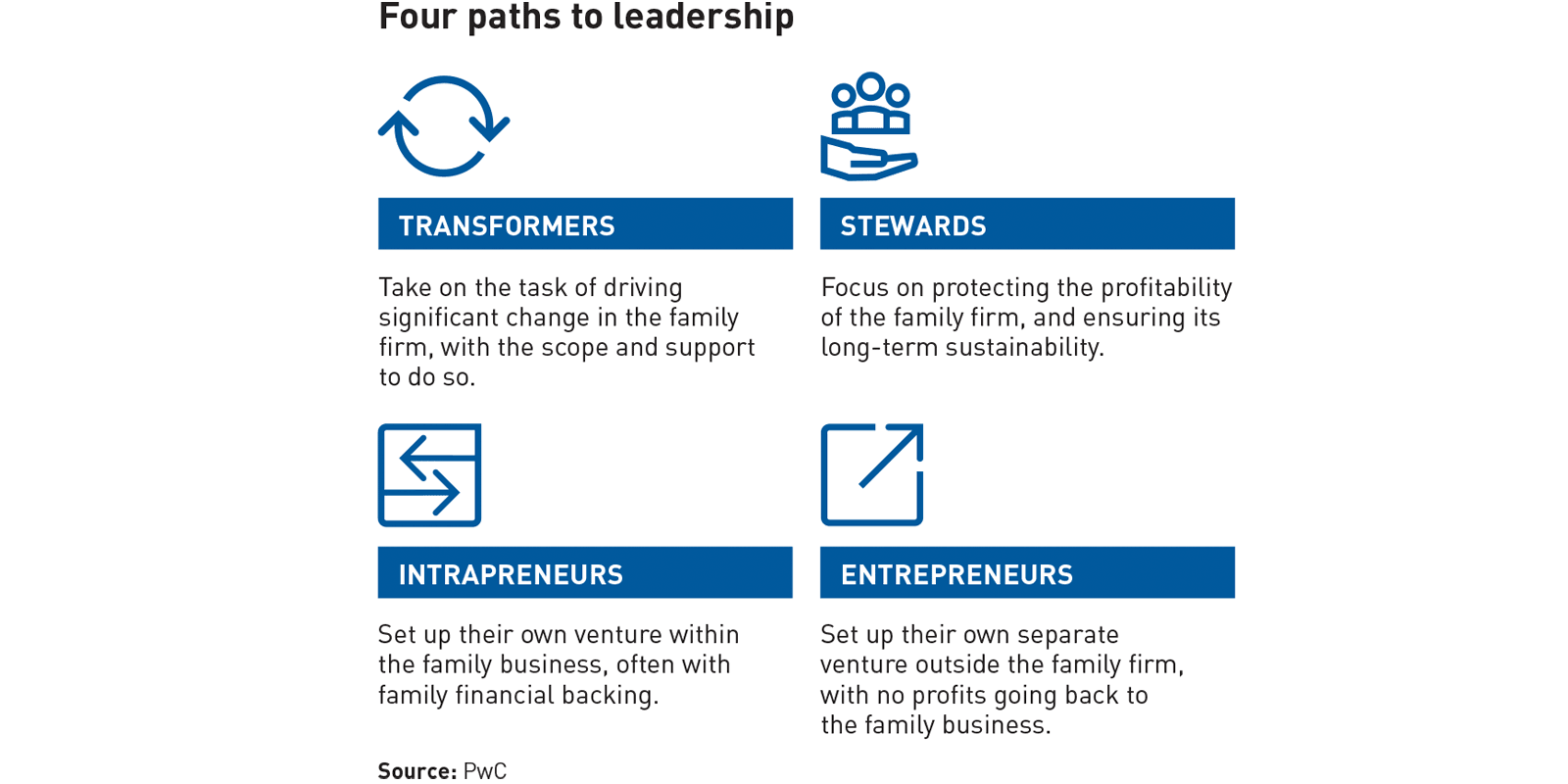Leaders in waiting
PwC’s latest survey of family-owned enterprises finds millennials ready to step up, and highlights four paths they can follow to success.

Jakarta, Indonesia, is a sprawling city of more than 30 million people. Like many other burgeoning capitals, it has a housing problem. Rents downtown are high, despite the fact that hundreds of thousands of properties are unoccupied. This forces people to travel many miles to get to work from the suburbs. Christina Suriadjaja saw this as an opportunity. In 2017, she pivoted her new company, Travelio.com, into the real estate management business, creating a platform offering short-term and long-term fully furnished rentals. Today Travelio represents more than 4,000 properties on an exclusive basis and earns 20 to 35 percent of the rental income they generate. It’s a success story with a twist: Christina is the 28-year-old daughter of Johannes Suriadjaja, owner of PT Surya Semesta Internusa, a US$300 million commercial property, construction, and hospitality company — and she was expected to enter the family firm, not start one of her own.
Many members of the rising generation of leaders in family businesses are trying to figure out their career paths. These “NextGen” leaders are committed to their family firm and want to contribute, but are not always sure how. Christina chose to prove that she had what it took not only to take over a successful concern but to build one herself. It required a strong will and persistence on her part to convince her family of this; it was four years before they invested in Travelio.
“The first time I went fundraising, my father didn’t help me at all. I got rejected by 23 [venture capital firms], and he just let me get rejected. So, he threw me under the bus, but it was the best lesson that I’ve learned, and we’ve raised three rounds of capital since then,” says Christina. Because of the record of success and business credibility Christina has built, her father recently invited her to become the CEO of the hospitality division of the family business — an offer she turned down. In November 2019, Travelio announced that it had raised an additional $18 million in Series B financing.
The future of family businesses is contingent on the quality and capabilities of tomorrow’s leaders. And that leadership bench is a critical issue indeed, because family businesses, both privately held and public, are a major component of the global economy. In 2019, the world’s 750 largest family businesses, as compiled by Family Capital with the support of PwC, had combined revenues of more than $9 trillion and directly employed around 30 million people.
Like Christina Suriadjaja, the rising generation of leaders in these businesses are committed and ambitious, and they are uniquely qualified to be agents of change, particularly with regard to the digital transformations that so many companies need to undertake. They are, after all, digital natives.
The rising generation of leaders in family businesses are committed and ambitious, and they are uniquely qualified to be agents of change, particularly with regard to digital transformations.
Too often, however, NextGen leaders feel that their desire and efforts to drive their family companies forward are constrained. Christina, for example, didn’t want to travel the more traditional route planned for her, which first would have entailed jobs in other companies in the industry for five years and then would have meant rotating through a series of positions within the family business. This frustration among the next generation may arise partly from an understandable impatience to take up the reins of leadership and contribute at a higher level. But, as PwC’s 2019 Global NextGen Survey of nearly 1,000 of these aspiring leaders across five continents and 11 industries reveals, it also is a function of how they are being groomed by the current leaders of their company, what responsibilities they are given, and whether their skills are being put to good use. A significant minority of NextGen leaders feel that so far, they are regarded more as apprentices than as future leaders. One in five (21 percent) agrees with the statement “I feel I need to prove myself before I can put forward my ideas for change.” One in 10 agrees with the statement “I make suggestions, but they are hardly ever listened to.”
These respondents have a point. Less than half — 48 percent — of NextGen survey respondents told us that they had been given responsibility for a specific change project or initiative. And only 36 percent of the respondents said that the current leaders of their company seek them out as sounding boards. This also corresponds with what we heard last year from the current generation of leaders: Many of them aren’t giving up control in the near term. PwC’s 2018 Global Family Business Survey found that 50 percent of the current generation of leaders plan to wait six or more years before passing on executive control or ownership to their NextGens.
The results of the NextGen survey are striking, and strikingly consistent across sectors and continents. NextGen leaders are anxious to serve as agents of change in their company, but they are struggling to earn their license to operate. To ensure that tomorrow’s leaders will be in place and prepared when it is their turn to rise to power, today’s leaders need to resolve this tension.
Meet the NextGen leaders
Almost all NextGen leaders are millennials, and most of them are the second or third generation to join the family business. More than half of the respondents in our survey are between the ages of 25 and 34. Two-thirds of them are male. Seventy percent of these rising leaders are already deeply engaged in their companies; 41 percent of them expect to be an executive director and 29 percent expect to be the majority shareholder within five years.
As is true for many of their fellow millennials, NextGen leaders do not lack self-confidence. They believe that they will be able to run their company successfully. Just over 70 percent of them call out problem-solving and leadership skills as essential to the future of their company — skills that they identify as their strongest attributes. Furthermore, they believe that they can add “significant value” to their company in a number of areas. These include professionalizing the company’s management practices, creating a clearly defined sense of purpose, attracting and enhancing talent, and developing a digitally driven business strategy. Almost two-thirds of NextGens say they can ensure that their companies are fit for the digital age (see “The digital divide”).
The digital divide
Slightly more than 60 percent of NextGens identify technology as one of the three most important drivers of change for their family business; for 13 percent, it is the most important. As members of the most digitally savvy generation, they believe they possess the knowledge and skills to drive digital transformations. Moreover, they are not satisfied with the progress their company is making in this regard: 90 percent of the survey respondents say that having a business strategy “fit for the digital age” requires significant or incremental change in the family business.
When we asked NextGens to pick the three most important technology areas for their businesses from a list of PwC’s “Essential Eight” technologies, they choose the Internet of Things, artificial intelligence, and robotics.
The “Essential Eight” technologies for NextGens’ family businesses
Leadership paths
We’ve worked with NextGens for many years and have watched them develop over time. Each of these young leaders is unique, but we have found — and have confirmed in the 2017 and 2019 Global NextGen Surveys — that they tend to follow one of four paths to leadership. With these paths in mind, we can identify NextGens as transformers, stewards, intrapreneurs, or entrepreneurs.
To test this thesis and validate our survey findings, we recently hosted two events, one for NextGens at the PwC NextGen Accelerator Academy at the Stanford University Center on Philanthropy and Civil Society, and one for current family business leaders in Monte Carlo in Monaco.
Building on our survey responses and on conversations at these events, we offer the following profiles of transformers, stewards, intrapreneurs, and entrepreneurs. We follow these profiles with recommendations for helping members of each of the NextGen cohorts achieve their ambitions, reach the top levels of their organization, and realize their potential in today’s rapidly evolving economy and in a society that is demanding more commitment to purpose from its business leaders.
Transformers: Reinventing the business
Three years ago, Felix Kroschke, 31, joined the executive board of Kroschke Gruppe, his family’s firm based in Ahrensburg, near Hamburg, Germany. Working alongside his brother, Philipp, who is CEO, Felix took on responsibility for finance, operations, and HR. But his mandate was transformation.
Over three generations, Kroschke Gruppe has grown into the leading supplier of vehicle license plates in the highly regulated German market, as well as a provider of vehicle registration and documentation services to fleet owners, rental companies, banks, and car dealerships. Along with many other companies, it is facing the prospect of digital disruption: Kroschke sells its license plates through a chain of 450 shops located near vehicle registration offices. Now, vehicle registration is moving online.
“Our challenge, knowing that things are going to change, is to use the profits we’ve got right now to transform our business,” says Felix. “If we don’t want to die, it’s not just digitization we need to think about; it’s also internationalization.”
To secure their company’s future, the Kroschke brothers are undertaking a digital transformation led by the creation of a blockchain-based platform for recording vehicle ownership. The company also is diversifying by buying stakes in digital players in the mobility market, including an app-based subscription service that lets users rent cars or ride-shares by the month and an e-commerce business selling new cars.
NextGen leaders are anxious to serve as agents of change in their companies, but they are struggling to earn their license to operate.
Felix is charged with ensuring that the firm’s transformation succeeds. He is building its digital capabilities by recruiting and hiring IT talent, convincing the existing staff to buy into the fundamental changes to its businesses and operating models, and remaking the culture of the company to support its new tech-driven focus. Felix is a member of the largest cohort of NextGen leaders: the 46 percent who are transformers.
Transformers aim to remake their companies, and they are confident in their leadership and problem-solving abilities. Of all the NextGen leaders, they are most likely to aspire to executive roles within five years (56 percent of transformers versus 41 percent of all respondents in our survey). Unsurprisingly, they also are less likely than other NextGen leaders to believe it’s necessary to rotate through a variety of roles within the business (17 percent versus 23 percent of all respondents).
To support NextGen transformers and help ensure their success, today’s leaders can take the following actions.
• Increase transparency. Be honest and share as much information as possible with the NextGen transformers to help them understand the issues the company faces and grow into seasoned executives.
• Talk openly about change. Each generation has a different perspective, and for this type of NextGen leader, it’s important to explicitly discuss the question of how the business must shift for the sake of its long-term sustainability.
• Strengthen corporate governance. Prepare for the time when transformers will take the helm. The company may need more flexible governance structures and an open-minded board prepared to accept change and risk.
• Mentor. Mentoring is one of the most effective ways to cement your relationships with NextGen transformers and equip them to take over. Mentoring should be a long-term process.
• Instill a culture of openness. Foster a culture that motivates NextGen transformers by expecting and accepting mistakes and capturing the lessons.
NextGen transformers can smooth their leadership journey by taking the following actions.
• Understand the perspective of the current generation. Trust your inner voice, but tone down criticism. Ask questions and be considerate. Avoid passive-aggressive responses when you are overruled.
• Innovate. In an era of business disruption, don’t be afraid to innovate. Act fast. Adjust your efforts in response to early results.
• Show gratitude. Respect the current generation’s reasons for the decisions they made, even if you believe change is needed.
• Expand your horizons. Collaborate widely, inside and outside the company. Do not compare yourself only with your traditional competition; instead, redefine your competition and the boundaries of your industry.
• Qualify and track progress. Review your work regularly, seek constructive feedback, and learn from your mistakes and your successes. You have to prove that your transformation is creating a competitive advantage.
Stewards: Maintaining the legacy
Allison Gettings, 37, is the daughter of Bill Sweasy, the current chair of Red Wing Shoes, based in Red Wing, Minn., and the fourth generation to join the family business. Best known for its work boots, Red Wing employs 2,300 people and produces about 5 million pairs of footwear a year under five brands. Allison is currently the only family member at the company, which has been run by a professional executive team since her father retired as CEO in 2014.
Apart from a break to set up her own women’s shoe business, Allison has worked at Red Wing since she was 23, first serving in junior roles and later launching Red Wing’s Women’s Heritage brand. In 2016, she assumed her current role as vice president and general manager of the Vasque brand of outdoor footwear, which was established by her grandfather in 1955.
“In regard to my growth within the organization, my dad made it clear that he wanted me to move throughout the organization,” Allison says. “In the early years, the jobs that I was in were like what we would do with anyone at the company. But I’ve been moving through roles more quickly than a normal employee. I’ve only been in each role for, at the most, three years.”
Allison is now preparing a major overhaul of the Vasque hiking shoes brand. But even through transformation, she says her goal is “to follow in my father’s footsteps.” Allison is among the 26 percent of NextGen leaders who are stewards.
Stewards are likely to be older than other NextGens (42 percent are older than 35, versus 36 percent of all respondents). They tend to be in management roles, and they aspire to nonexecutive and governance roles. Stewards are strongly focused on their company’s existing markets and are likely to view social and environmental factors as drivers of change for the business.
To support NextGen stewards and help ensure their success, today’s leaders can take the following actions.
• Communicate. Make it a habit to connect, consistently and in an open and transparent manner. Clearly articulate what you expect from NextGen stewards.
• Set out clear, shared values. Be explicit about the values that guide the company. Invite your steward NextGen leaders to participate in framing those values. This will strengthen the culture of the business and make the family more cohesive.
• Allow the stewards to be themselves. Provide options for them to develop their experience and knowledge, and avoid dictating to them.
• Give stewards opportunities to learn from you. Give them access to the inner circle. Share the lessons of your successes and the insights from your failures.
• Avoid excessive pressure. The route to success is motivation, not pushing.
NextGen stewards can smooth their leadership journey by taking the following actions.
• Don’t take your role for granted. Be mindful of others’ expectations, and put purpose and impact at the top of your agenda. Cultivate your ability to speak up while honoring that role.
• Know your background. Be conscious of the legacy of the business and what it stands for.
• Realize that you don’t have to know everything. Be smart, listen, and ask questions.
• Find your own motivation. Ask yourself what the business means to you, and what is the purpose that drives you. Keep searching for what motivates you; it may not be obvious or fully formed at first.
• Think beyond the traditional. Although you may favor a conservative approach, stay attuned to unconventional opportunities in your industry and beyond.
Intrapreneurs: New ventures from the inside
Intrapreneurs tend to view their company as desperately needing a more entrepreneurial culture. There are many examples of scions who have started successful businesses under the umbrella of the family brand: Think of William P. Lauder, grandson of Estée Lauder, who developed the Origins skincare line, which is now a prominent brand in the company’s portfolio of businesses. At the same time, intrapreneurs are likely to feel the need to prove themselves before presenting their ideas for change (27 percent of intrapreneurs feel this way, versus 21 percent of all respondents). Overall, 20 percent of the survey respondents identified as intrapreneurs. Their top priority is attracting talent, and they believe their greatest asset is developing a strategy fit for the digital age. Interestingly, the highest concentration of intrapreneurs is in the Asia-Pacific region, where more than half of the survey respondents identified themselves as members of that NextGen cohort.
To support NextGen intrapreneurs and help ensure their success, today’s leaders can take the following actions.
• Accept risk taking. Foster a culture that recognizes the value of the intrapreneurs’ efforts. Accept mistakes and focus on the lessons they offer. Consider using deadlines and a formal structure to build momentum.
• Take opportunities. Find opportunities for intrapreneurs to set up and manage internal businesses within the family firm. Help them develop their leadership qualities.
• Mentor. Provide ideas and feedback and share experiences from the past. Start the mentoring process early in intrapreneurs’ careers.
• Promote values. Work together with intrapreneurs to set out clear values.
• Innovate. Be open to infrastructural technologies that might support innovation and new ventures.
NextGen intrapreneurs can smooth their leadership journey by taking the following actions.
• Take opportunities. Find an opportunity and make maximum use of your family’s resources and network to build the business.
• Strengthen knowledge. Develop in-depth knowledge of markets and regions you want the business to enter.
• Align values. Your venture is operating under the family’s umbrella, so ensure it aligns with the values set out by the current generation.
• Innovate. Constantly seek out technological innovations — particularly those related to processes and practices — that could boost productivity and benefit your venture or the family business.
Entrepreneurs: New ventures from the outside
Fernando Simões Filho was only 16 when he started work in his family’s business, JSL SA, a $2 billion logistics and transportation conglomerate based in São Paulo, Brazil, that had been founded by his grandfather in 1956. But he was always interested in social enterprises, and his career direction changed dramatically while he was studying for an MBA in the United States.
In 2013, Fernando returned to Brazil to take a course on social enterprise business at the Yunus ESPM Social Business Centre (the curriculum is based on the work of Nobel laureate Muhammad Yunus). Energized by his desire to work in sustainability, he studied holistic science and economic transition at Schumacher College, while at the same time starting an executive MBA in Brazil. Fernando, now 32, cofounded Bemtevi Investimento Social the following year with two partners.
Bemtevi raises money from private individuals in Brazil and channels it into supporting the development of social enterprises. To date it has attracted more than 50 investors and has made 10 loans to seven businesses. Fernando’s aim is to build a leading social enterprise investment vehicle in Brazil that puts entrepreneurs at the forefront of solving social and environmental problems. He also wants to share his experience with JSL, where he is a board member and chair of the sustainability committee.
Fernando’s position allows him to influence JSL’s engagement with the sustainability issues in which he passionately believes. “My aspiration is that the family firm keeps evolving and increasingly adopts a sustainable business model,” he says. “Huge transformations are underway, and big companies have to adapt. This is fundamental because the next generation has a completely different way of thinking. As investors, clients, and employees, they will have a big impact on the future of these companies. I also want the whole company to create positive impact, to make this its purpose and objective.” Fernando, like Christina Suriadjaja, is among the 8 percent of NextGen survey respondents who are entrepreneurs.
Entrepreneurs are more skeptical than any other NextGen cohort about their business’s performance against competitors (20 percent feel skeptical, versus 9 percent of all respondents), and 19 percent of them believe that the business lacks a strong sense of purpose. They are more likely to feel their suggestions are ignored and less likely to see themselves as future leaders of the business, even though they want to lead a business.
To support NextGen entrepreneurs and help ensure their success, today’s leaders can take the following actions.
• Prepare for multiple opportunities. Develop an open mind-set and allow entrepreneurs to develop, even if it means they set up in a venture independent of the family business.
• Support their ambitions. Allow entrepreneurs to work on their business ideas and, where possible, provide them expertise, support, and mentoring.
• Broaden their work experiences. Entrepreneurs may need to look beyond the business for the experience and inspiration they require. This may involve consultation with outsiders, stints in other enterprises, or relevant executive education.
• Respect different life choices. Support entrepreneurs in exploring alternative career options or venture opportunities. If you invest, establish the kind of standards — neither more nor less strict — that you would set for other ventures.
• Have faith in their ventures. Show entrepreneurs that you believe in them even though they are not directly supporting the business. Know that they are not being disloyal.
NextGen entrepreneurs can smooth their leadership journey by taking the following actions.
• Stay connected to your legacy. You come from a background that gives you privileged access to business knowledge and experience. Learn everything you can from that legacy.
• Acquire knowledge. Immerse yourself in the field that fascinates you before you attempt to launch a business. Get quality training and advice from the outside world.
• Create a vision. Set out the mission for your own venture explicitly and make sure everyone involved understands it.
• Seek support. Don’t try to do it on your own. Learn how to delegate and draw on advice and support from your family business as much as possible. Be open to mentoring.
• Trust yourself. Listen to your inner voice and decide for yourself, ultimately, what you believe is great work.
Our work with NextGen leaders has convinced us that they have the attributes and outlook needed to become effective business leaders. They clearly see the challenges in the current business environment, which is characterized by intense competition, changing customer needs, new technologies, and economic uncertainty. Before NextGen leaders can address these challenges, however, they must win the trust of today’s leaders and earn a license to operate at the top level. And today’s leaders must recognize the NextGens’ digital and leadership skills and find more effective ways to help them make the transition to a senior leadership role. As more and more companies face the inevitable leadership transition between generations, the willingness and the deftness with which both generations approach these tasks will determine the future of their companies.
Author profile:
- Peter Englisch is the global family business and EMEA entrepreneurial and private business leader at PwC. Based in Essen, he is a partner with PwC Germany.






